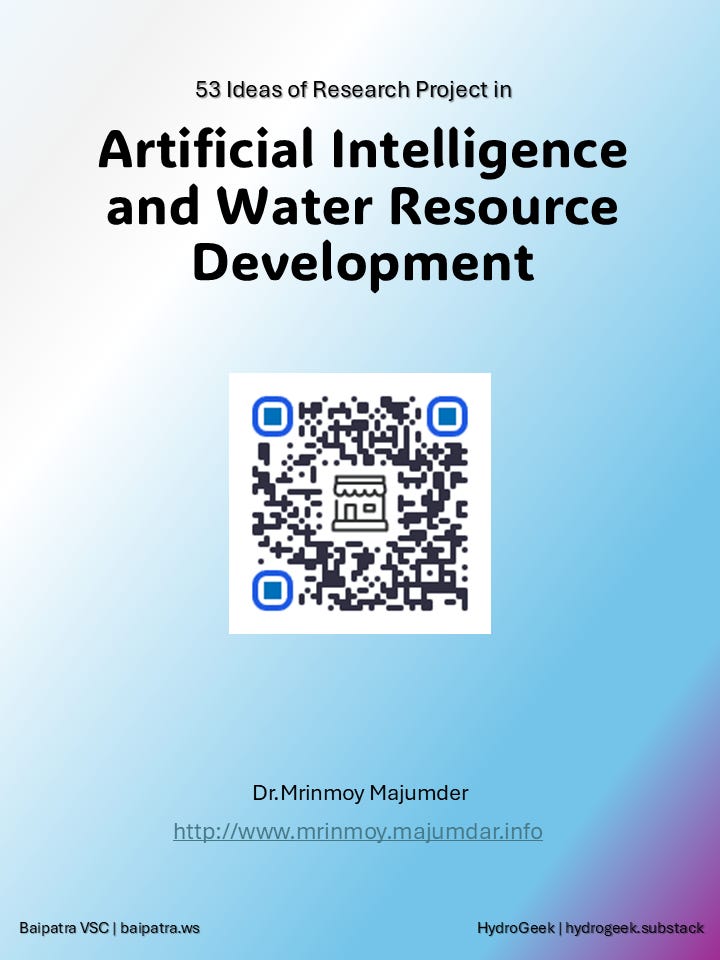53 Ideas of Research Project in Artificial Intelligence and Water Resources
In this document, you will find 53 ideas on which you can do your research project with Artificial Intelligence and Water Resource Development. This volume mainly deals with Flood Modeling and Drought
You can also buy the book in USD. Click here.
Artificial intelligence (AI) can revolutionize water resource management by optimizing distribution systems, predicting water quality, and enhancing decision-making for sustainable use. It can lead to more efficient resource allocation, reduced costs, and improved system performance. Future research projects could focus on developing advanced AI algorithms for real-time monitoring and control, optimizing irrigation practices, and minimizing water waste in agriculture. This document offers 53 ideas for research projects in AI and water resource development, focusing on flood modeling and drought detection.
Excerpts from the book :
Application of GIS based Optimization Techniques with Artificial Intelligence for Drought Identification and Response Planning
One of the key tools that water managers can utilize in their efforts to address drought conditions is Geographic Information Systems (GIS). GIS technology allows for the visualization and analysis of spatial data, making it an invaluable tool for identifying areas at risk of drought and developing targeted response plans. By integrating GIS-based optimization techniques into their decision-making processes, water managers can better allocate resources and prioritize actions to mitigate the impacts of drought on local communities and ecosystems. However if AI is also added as a predictor then the efficiency of the system become advanced due to the flexibility AI can bring in a numerical model.
Selection of Most Effective Optimization Techniques for different regions with varying levels of Drought
When selecting the most effective optimization techniques for different regions with varying levels of drought, it is important to consider the specific characteristics and challenges of each area. Factors such as climate, geography, water demand, and existing infrastructure must be taken into account to determine the most suitable approach. By tailoring optimization techniques to the unique needs of each region, water managers can maximize efficiency and effectiveness in addressing drought conditions. Additionally, ongoing monitoring and evaluation of the chosen techniques will be essential to ensure that they continue to meet the evolving needs of each region as drought conditions change over time. By adopting a flexible and adaptive approach to optimization, water managers can better manage water resources and mitigate the impacts of drought in a sustainable and environmentally responsible manner.
Investigating how AI based machine learning algorithms can be utilised to improve the accuracy and efficiency of drought identification processes.
Machine learning algorithms have the potential to enhance the accuracy and efficiency of drought identification by analyzing complex data patterns. This can provide valuable insights for policymakers and stakeholders to make informed decisions for effective drought management. If AI technologies are hybridized with ML then the result can be more realistic and also adaptive.
……………………………..and fifty more such ideas can be found in this book.
Please Note: To continue access to this article after the initial seven days, please upgrade to a personal paid membership against a meagre cost of Rs.600/= per year. If you want to promote your Job/Scholarship/PhD/Post Doc or any other types of opportunities in The HydroGeek Newsletter, then kindly upgrade yourself to an Institute /Founder (Cost : Rs.2500/yr.) or Group(Cost : Rs.750/= per yr.) Membership (if you want to pay in USD then Click here)
The information provided above is presented in the order in which it was received from the source. The application link and dates are the same as those that were provided by the source. Shared knowledge is based on what is received. the author of this post and HydroGeek are not liable for any liability or damage resulting from the use of this information. Additionally, our Terms and Conditions as well as our Privacy Policy are presented here for your perusal. After taking into account the honorarium and the cost of maintenance, the amount that is obtained in exchange for the membership fee or through any other methods, if any, is then donated to non-profit organisations.
If you want to add a PhD Position/Post Doc/Job Opportunity that you want to offer to HydroGeek Subscriber, then please email me the content and link for applying at : contact@baipatra.ws or Chat with me through Substack
You may also like
Very Short-Term Course on Hydroinformatics
My YouTube Channel: Mrinmoy’s Views
Call for Paper for Virtual Forum on Water and Environment 2025
Lecture Notes on MCDM: Learn with Example 12 MCDM Techniques
Artificial Intelligence and its Application on Water Resource Development
Host and Earn(AD)
“Teaching marketplace with over 1,30,000 courses!”(AD)


